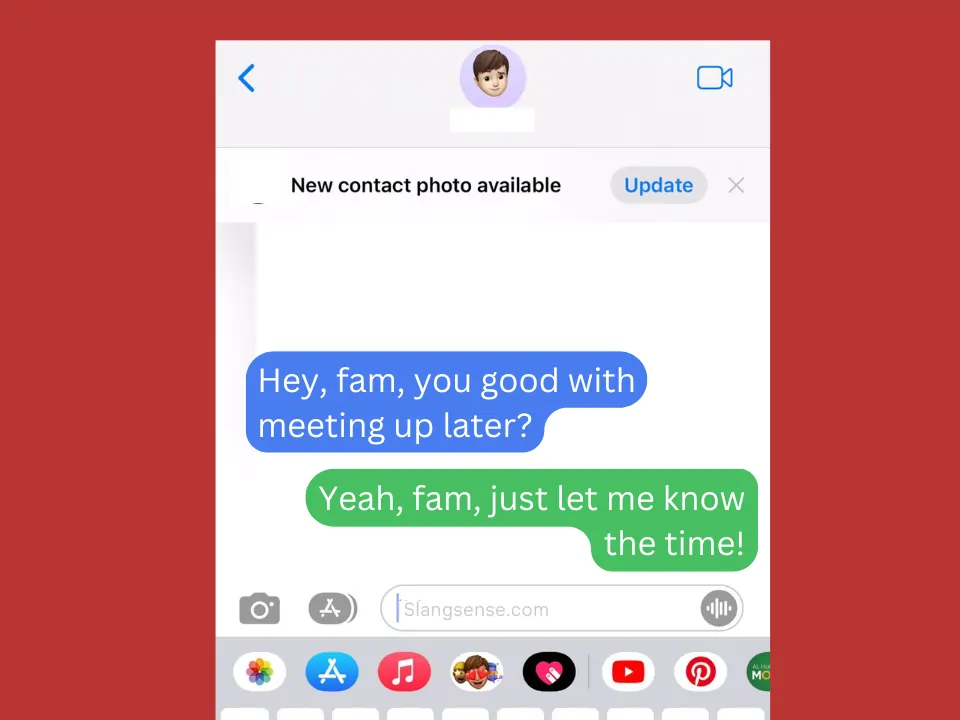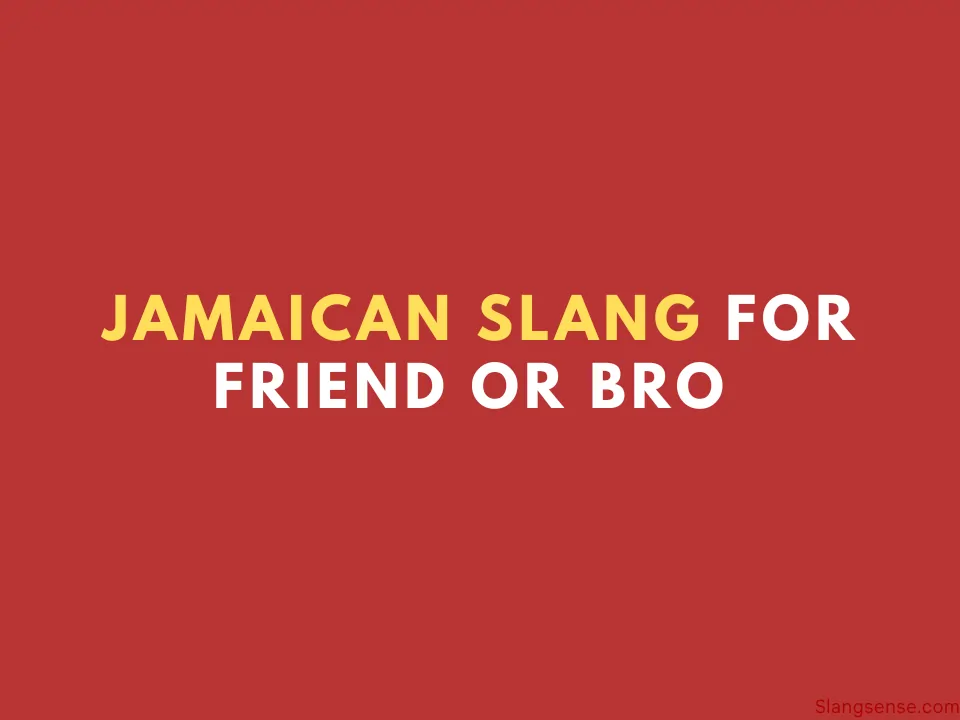Jamaican Slang For Friend Or Bro: A Deep Dive Into The Language Of Jamaica
Ever wondered how Jamaicans greet their buddies or what they call their best mates? If you're diving into Jamaican culture, understanding the slang is like getting a backstage pass to their vibrant world. Jamaican slang for friend or bro is not just words; it's a way of life. So, buckle up because we're about to take you on a journey through the colorful language of Jamaica.
When you think of Jamaica, reggae music, sandy beaches, and Bob Marley probably come to mind. But there's so much more to this Caribbean gem than meets the eye. The language, or more specifically, the slang, plays a crucial role in Jamaican culture. It's the heartbeat of everyday conversations, and knowing a few phrases can make your interactions with locals much smoother.
Learning Jamaican slang for friend or bro isn't just about expanding your vocabulary; it's about connecting with a culture that values community and camaraderie. Whether you're planning a trip to Jamaica or simply curious about their linguistic nuances, this article will be your ultimate guide. So, let's get started and make some new "bredren" along the way!
Read also:Jess Hilarious Naked The Untold Story Behind The Viral Sensation
Table of Contents
- Introduction
- The Jamaican Language: A Unique Blend
- History of Jamaican Slang
- Common Jamaican Slang for Friend or Bro
- Cultural Significance of Jamaican Slang
- How to Use Jamaican Slang Properly
- Reggae Music's Influence on Slang
- Travel Tips: Using Slang in Jamaica
- Resources for Learning Jamaican Slang
- Conclusion
Introduction
Welcome to the world of Jamaican slang, where every word carries a story and every phrase is a piece of art. If you've ever been curious about how Jamaicans refer to their friends or bros, you're in the right place. Jamaican slang for friend or bro is more than just vocabulary; it's a reflection of the island's rich cultural tapestry.
This article will take you on a deep dive into the language of Jamaica, exploring its origins, usage, and cultural significance. By the end, you'll be able to drop a few slang terms like a local and maybe even make some new "bredren" of your own.
The Jamaican Language: A Unique Blend
Let's talk about the Jamaican language, which is a fascinating mix of English, African dialects, and a sprinkle of Spanish and Portuguese. Jamaican Patois, as it's commonly known, is the everyday language spoken by most Jamaicans. It's a vibrant and expressive form of communication that reflects the island's diverse heritage.
A Brief History of Jamaican Patois
Jamaican Patois evolved from the need for communication between African slaves and European colonizers. Over time, it developed into a unique language with its own grammar, vocabulary, and pronunciation. Today, it's a source of pride for many Jamaicans and an integral part of their identity.
Here are some key features of Jamaican Patois:
Read also:Angelica Maria The Rising Star Taking The World By Storm
- Rich in metaphors and idiomatic expressions
- Incorporates words from various African languages
- Has a distinct rhythm and intonation
History of Jamaican Slang
Jamaican slang has deep roots in the island's history and culture. It started as a way for the enslaved Africans to communicate without their oppressors understanding. Over the years, it has evolved to include modern influences, such as reggae music and global trends.
The slang is a living language, constantly changing and adapting to new contexts. It's a testament to the creativity and resilience of the Jamaican people. Here are some historical milestones in the development of Jamaican slang:
- 17th Century: Emergence of Patois as a distinct language
- 20th Century: Influence of reggae music on slang
- 21st Century: Globalization and the spread of Jamaican slang
Common Jamaican Slang for Friend or Bro
Now, let's get to the good stuff. Here are some common Jamaican slang terms for friend or bro:
Bredren
This is probably the most widely recognized term for a friend or brother in Jamaica. "Bredren" is a contraction of "blood brethren" and is used to refer to close male friends or family members.
Sista-man
While "bredren" is used for men, "sista-man" is the go-to term for female friends. It's a playful and affectionate way to address your "sista" or "girlfriend."
Here's a quick list of other popular terms:
- Gwaan: A friendly greeting or farewell
- Fam: Short for family, used to refer to close friends
- Ya mon: A versatile term that can mean "yes," "sure," or "alright"
Cultural Significance of Jamaican Slang
Jamaican slang isn't just a collection of words; it's a cultural phenomenon that reflects the island's values and traditions. It's a way of expressing solidarity, humor, and resilience in the face of adversity.
The use of slang in everyday conversations is a sign of belonging and acceptance. It's a way for Jamaicans to connect with each other and celebrate their shared heritage. Understanding the cultural significance of Jamaican slang can deepen your appreciation for the language and the people who speak it.
How to Use Jamaican Slang Properly
Using Jamaican slang correctly requires more than just memorizing a few words. It's about understanding the context and nuances of the language. Here are some tips to help you use Jamaican slang like a pro:
- Listen to how locals use the slang in conversations
- Pay attention to the tone and intonation
- Don't be afraid to ask for clarification if you're unsure
Remember, language is a tool for communication, and using slang appropriately can enhance your interactions with Jamaicans.
Reggae Music's Influence on Slang
Reggae music has played a significant role in popularizing Jamaican slang around the world. Artists like Bob Marley, Peter Tosh, and Bunny Wailer have used slang in their lyrics, bringing it to a global audience.
Reggae music is more than just entertainment; it's a form of expression that reflects the struggles and aspirations of the Jamaican people. The slang used in reggae songs often carries deeper meanings and messages that resonate with listeners worldwide.
Travel Tips: Using Slang in Jamaica
If you're planning a trip to Jamaica, learning a few slang terms can enhance your experience. Here are some tips to help you navigate the language barrier:
- Start with basic greetings like "gwaan" and "ya mon"
- Use "bredren" and "sista-man" to show respect and camaraderie
- Be mindful of cultural differences and use slang appropriately
Engaging with locals in their language can open doors to new experiences and friendships. Just remember to be respectful and open-minded.
Resources for Learning Jamaican Slang
There are plenty of resources available for those who want to learn Jamaican slang. From online dictionaries to language apps, you can find everything you need to get started. Here are a few recommendations:
- Jamaican Slang Dictionary: A comprehensive online resource for learning slang
- Language Exchange Programs: Connect with Jamaican speakers to practice
- Reggae Music: Listen to songs by Bob Marley and other artists to hear slang in action
Immersing yourself in the language and culture is the best way to learn Jamaican slang. So, grab your headphones and start exploring!
Conclusion
In conclusion, Jamaican slang for friend or bro is more than just words; it's a cultural treasure that reflects the island's history and identity. By learning a few key terms and understanding their cultural significance, you can connect with Jamaicans on a deeper level.
We encourage you to engage with the language and culture by using slang appropriately and respectfully. Share your newfound knowledge with others and help spread the vibrant spirit of Jamaica. And remember, whether you're calling someone "bredren" or "sista-man," it's all about building connections and celebrating diversity.
So, what are you waiting for? Dive into the world of Jamaican slang and make some new friends along the way. Who knows, you might just find your new "bredren" or "sista-man" waiting for you on the beaches of Jamaica!


